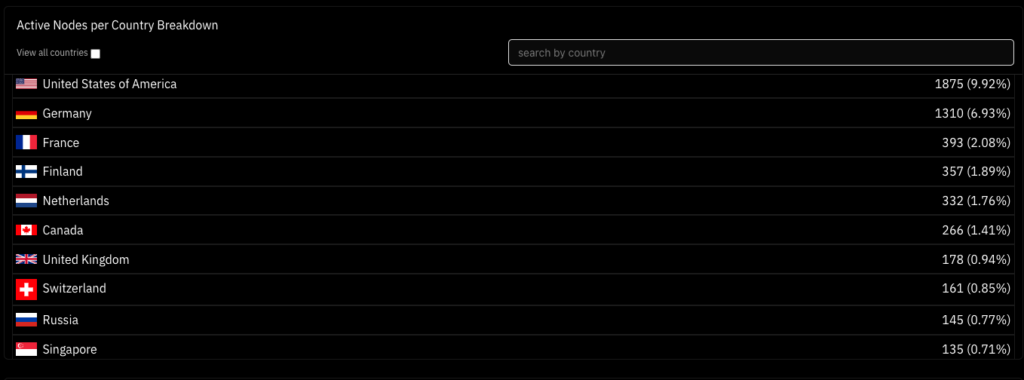Running a Bitcoin node has become an essential practice for those passionate about decentralization and the security of the Bitcoin network. But with the rise of Bitcoin-based assets like Ordinals, running a node has gained even more attention. So, is setting up a node right for you? Let’s dive into the pros, cons, and key details to help you decide.
What is a Bitcoin Node?
A Bitcoin node is a computer that participates in the Bitcoin network by validating and relaying transactions and blocks. Essentially, nodes are the backbone of the Bitcoin blockchain, ensuring that the network remains secure, transparent, and decentralized. By running a node, you’re actively supporting Bitcoin’s decentralized ethos and helping to verify transactions independently. Bitcoin nodes come in different types, each with unique roles and functionalities.

4 Different Types of Bitcoin Nodes
1. Full Nodes
Full nodes are the gold standard for anyone serious about supporting the Bitcoin network. These nodes store the entire blockchain (all transactions since Bitcoin’s inception) and validate transactions and blocks. Running a full node provides maximum security and allows users to verify transactions independently. However, it requires significant storage and computational power.
2. Lightweight (SPV) Nodes
Lightweight nodes, also known as Simplified Payment Verification (SPV) nodes, don’t store the entire blockchain. Instead, they rely on full nodes to verify transactions. SPV nodes download only the headers of blocks instead of full transaction data, making them faster and more storage-efficient. However, they are somewhat dependent on full nodes and offer less security.
3. Pruned Nodes
Pruned nodes are a type of full node that saves storage space by deleting older parts of the blockchain, keeping only the most recent data. They still validate transactions like a full node but use far less storage, making them a great option for users who want the benefits of a full node without the hefty storage requirements.
4. Mining Nodes
Mining nodes are full nodes that also participate in the process of mining new blocks. While mining nodes verify transactions and add blocks to the blockchain, they’re typically run by miners who have the necessary hardware to solve complex computational problems. Mining nodes are crucial for the network’s security but are different from standard full nodes in that they also earn rewards for block validation.
Specs for Running a Bitcoin Node
Running a Bitcoin node doesn’t require high-end hardware, but it does require specific resources:
- Storage: A full node requires at least 500GB of storage, though this number grows over time as more blocks are added to the blockchain.
- Memory (RAM): 4GB of RAM is sufficient, though more can improve performance, especially for users running additional applications on the same device.
- Processor: A multi-core CPU helps speed up transaction validation, but most modern processors will suffice.
- Internet Connection: A stable internet connection with sufficient bandwidth is essential, as full nodes continuously download and upload data to the network.
- Electricity: Running a full node 24/7 will add to electricity costs, though these are generally minimal for most users.
If storage or bandwidth is a concern, consider running a pruned node, which requires significantly less storage but still provides security and decentralization benefits.
Why Ordinals Made Nodes Popular Again
With the introduction of Ordinals, interest in running Bitcoin nodes saw a resurgence. Ordinals allowed Bitcoin users to inscribe unique digital assets directly onto individual satoshis, turning Bitcoin into a blockchain capable of supporting NFTs. This new capability attracted developers, collectors, and traders to the Bitcoin network and highlighted the benefits of running a node. Running a Bitcoin node with Ordinals support allows users to verify inscriptions and interact with Bitcoin-based NFTs without relying on third-party platforms. This autonomy is a game-changer for those who value privacy and want full control over their digital assets, as it provides an alternative to NFT ecosystems on Ethereum and other blockchains. The rise of Bitcoin Ordinals has made running a node more popular among enthusiasts and developers alike, who see nodes as a way to gain full control over their interactions with Bitcoin-based assets.
Pros and Cons of Running a Bitcoin Node
Pros:
- Enhanced Privacy: Running your own node eliminates the need to trust third-party servers with your transaction data, enhancing your privacy.
- Support Bitcoin’s Decentralization: By running a full node, you contribute to Bitcoin’s decentralized nature, making it more resistant to censorship and attacks.
- Independence and Control: Verify transactions and validate blocks yourself instead of relying on third parties.
- Ordinals Compatibility: Access the Ordinals ecosystem directly through your node, allowing for more private and direct interaction with Bitcoin-based NFTs and other assets.
Cons:
- Resource Intensive: Requires significant storage space and constant internet connection.
- Electricity Costs: Running a node continuously can add to your electricity bill.
- Technical Knowledge: Setting up and maintaining a node requires some technical expertise, though guides are available to help beginners.
- No Direct Financial Incentives: Unlike mining, running a standard Bitcoin node doesn’t directly reward users financially, though some argue that its non-monetary benefits make it worthwhile.
Who Should Run a Bitcoin Node?
Running a Bitcoin node is ideal for:
- Developers: Those building on Bitcoin and exploring Ordinals can benefit from the direct access and control that nodes provide.
- Enthusiasts: Anyone interested in supporting Bitcoin’s network and security will appreciate the added benefits of running a full node.
- Ordinals Collectors: Collectors and creators of Ordinals who want autonomy over their digital assets will benefit from the independence that nodes provide.
- Privacy Advocates: Users who prioritize privacy and want to avoid third-party data exposure should consider running their own node.
Running a Bitcoin node isn’t for everyone, but for those passionate about decentralization, privacy, and the Bitcoin ecosystem, it offers undeniable benefits. Whether you’re interested in exploring Bitcoin Ordinals, supporting Bitcoin’s decentralization, or simply gaining more control over your transactions, running a node can be a rewarding endeavor.



